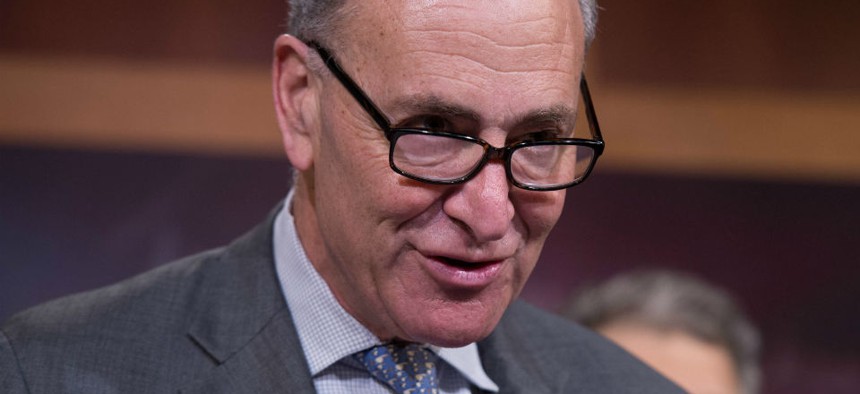
Sen. Chuck Schumer, D-N.Y., introduced the legislation. Flickr user Senate Democrats
It Could Get a Lot Harder for Social Security to Close Field Offices
Senator introduces bill that would require a public comment period on planned closures and a report to Congress.
A bill awaiting Congress when it returns from its August recess would attempt to slow field office closures at the Social Security Administration, an agency that has shuttered more than 60 facilities in recent years.
The 2014 Social Security Access Act, introduced by Sen. Chuck Schumer, D-N.Y., aims to bring more community input into the closure process. The bill would require SSA to provide 180 days’ notice to “all individuals residing in areas serviced” by any field office subject to any “reduction in access.”
In addition to the 64 field office closures, SSA has shuttered 533 temporary mobile offices since 2010. The agency still maintains a network of 1,250 offices across the country to provide customer service to nearly 64 million Social Security recipients.
Schumer’s bill would create a public comment period and require SSA to hold at least one public hearing a month after disseminating information to constituents about an upcoming closure. The agency would have to post online and provide in writing to local members of Congress and other elected officials a range of information about the decision, including the number of SSA employees affected, the number of people who visit the office, Internet access in the region, transportation options to the next closest facility, projected cost savings and the estimated cost of co-locating with another federal agency instead of the proposed closure.
The SSA commissioner would also have to submit a report to Congress justifying the closure, and findings made as a result of the public comments or meeting.
A recent report from the congressionally chartered National Academy of Public Administration, released in conjunction with SSA, found the only viable solution for the agency going forward was to shift dramatically to digital customer service. The report stoked fears among labor groups, which said the recommendations made would result in SSA shedding 30,000 jobs.
Those concerns appear to be overstated, however.
“Lean budgets have forced us to make difficult choices and to cut back on some services,” acting SSA Commissioner Carolyn Colvin recently told a Senate committee. “However, I want to assure you that we are fully committed to providing face-to-face service to members of the public who want or need it. We recognize the importance of providing direct service to the public. We have no plans to abandon our network of field offices. They have been the hallmark of our service for almost 80 years.”
Still, the bill is “essential,” the American Federation of Government Employees stated.
“Sen. Schumer’s bill brings much-needed accountability to the Social Security Administration’s community office closings and sheds light on the impact they have on at-risk populations,” AFGE National President J. David Cox said. “This bill must be enacted before another community is deprived of vital services and the expertise of local SSA staff.”
AARP also praised the bill, calling in-person service a necessary part of the federal benefit.
“AARP applauds Sen. Schumer for recognizing that retirees often need a human hand to help them access the benefits they worked their whole lives to earn,” said Beth Finkel, state director of AARP in New York, “and for understanding the importance of protecting the system that allows older and disabled Americans to live with dignity and support their families.”
The bill would require SSA to provide Congress with its “long-term strategy” for face-to-face services and recommendations to reform the process by which offices are selected for closure. SSA already plans to issue a report on its long-term vision in October.
(Image via Flickr user Senate Democrats)







